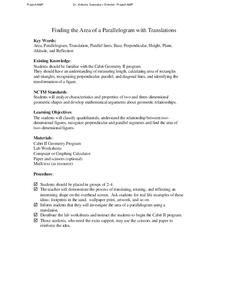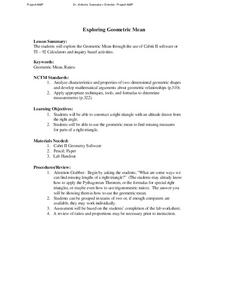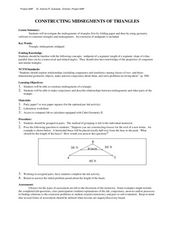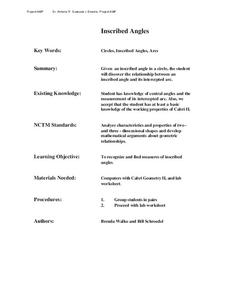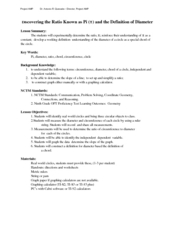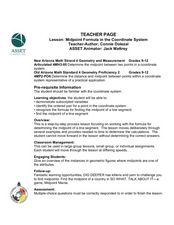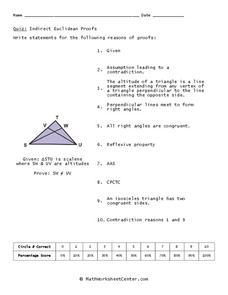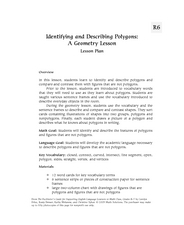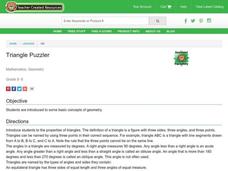Curated OER
Corresponding Sides and Angles of Similar Triangles
Students differentiate between corresponding sides ad angles of two triangles. In this geometry lesson, students identify the differences as well as the similarities between two triangles. They differentiate between similar and...
Curated OER
Side Splitter Triangles
Students investigate the side splitter theorem. In this geometry lesson, students estimate and solve problems dealing with ratios and proportions. They identify angles created by lines that are parallel.
Curated OER
Finding the Area of a Parallelogram with Translations
Learners calculate the area of a parallelogram. In this geometry lesson, students perform translation using a coordinate plane and coordinate pairs. They perform translation on other polygons.
Curated OER
Finding the Area of a Parallelogram with Translations
Students calculate the area of parallelograms. In this geometry lesson, students identify properties of parallelograms and use to to solve problems. They create polygons using Cabri software.
Curated OER
Constructing Perpendiculars
Students construct perpendicular lines. For this geometry lesson, students use a compass and straight edge to do construction. They start from a point to a line.
Curated OER
Exploring Geometric Mean
Students solve problems using geometric means. In this geometry lesson, students create altitudes in right triangles. They use Cabri software to move the triangle around and observe different sides and angles.
Curated OER
Exploring Geometric Mean
Student identify the solution using geometric mean. In this geometry activity, students create right triangles where the altitude of the triangle is the side containing the right angle. They modify shapes using Cabri software and observe...
Curated OER
Properties of Special Parallelograms
Students identify properties of trapezoids. In this geometry lesson, students are put into groups and use computer programs to analyze polygons. They drag and move the shapes around as they make predictions.
Curated OER
Constructing Midsegments of Triangles
Students construct midsegments. In this geometry lesson, students make conjectures and apply properties of triangles to solve problems. They complete an activity on the computer.
Curated OER
Isosceles Triangles
Students identify the properties of an isosceles triangle. In this geometry activity, students find the midpoint, median and angle bisector of a triangle. They construct angle bisectors and measure missing angles.
Curated OER
Inscribed Angles
Learners calculate the inscribed angle of a triangle. In this geometry instructional activity, students identify the angle created by intersection of a triangle and a circle. They see the relationship between the arc and the angle.
Curated OER
Discovering The Ratio Pi And The Diameter
Students relate the ratio of Pi to the diameter of a circle. In this geometry lesson, students investigate the relationship of the chord of the circle the the number Pi. They define ration, chord, circumference and diameter and find...
EngageNY
Definition of Translation and Three Basic Properties
Uncover the properties of translations through this exploratory lesson. Learners apply vectors to describe and verify transformations in the second installment of a series of 18. It provides multiple opportunities to practice this...
Curated OER
Midpoint Formula in the Coordinate System
Students calculate the midpoint of a line. In this geometry lesson, students identify the different parts of the coordinate plane. They use the midpoint formula to find the middle of segments between a pair of coordinates.
Curated OER
Introducing Angles
Sixth graders identify, compare and interpret the characteristics of polygons and angles in order to meet spatial sense, geometry and measurement standards. They also sort shapes into three categories, polygons (regular and irregular)...
Curated OER
Diagonals to Quadrilaterals II
Learners identify the properties of different polygons. In this geometry lesson plan, students find the slope of a line and calculate the distance between two lines. They differentiate between similar and congruent polygons.
Curated OER
Reflections
Fifth graders create a reflection of a poygon using a Mira. They discover that a line connecting a vertiex of a polygon and the corresponding vertex of its reflection is perpendicular to the line of reflection. Students create a glide...
Curated OER
"Geotown" Scrapbook
Students create a scrapbook. In this geometry lesson, students use digital cameras to take pictures of geometrical concepts. Students use the pictures to create a "Geotown" scrapbook.
Curated OER
Camping with a Triangular Prism and Its Net
Students differentiate triangular prisms from other prisms using nets. In this geometry lesson, students define the properties of a triangular prism and its symmetry. They build a triangular prism moving lines around.
Curated OER
Indirect Euclidean Proofs
In this Euclidean proofs activity, 10th graders solve 10 different problems that include completing indirect Euclidean proofs. First, they write a statement for each of the reasons listed on the sheet of proofs. Then, students solve the...
Curated OER
Triangle Fundamentals Homework
In this geometry worksheet, students identify the missing angles of non right triangles using the angle sum theorem. They solve for the unknown using algebra. There are 21 questions.
Curated OER
Diagonals of Quadrilaterals
Young scholars find the diagonals of the quadrilaterals. In this geometry lesson, students identify and use properties of quadrilaterals. They define different parts of a quadrilateral shape.
Curated OER
Identifying and Describing Polygons
Pupils identify the different properties of polygons. In this geometry lesson, students differentiate between polygons and non-polygons. They review important vocabulary to help them understand the properties of polygons.
Curated OER
Triangle Puzzler
Students are introduced to some basic concepts of geometry. They explain that the definition of a triangle is a figure with three sides, three angles, and three points. Triangles can be named by using three points in their correct sequence.





